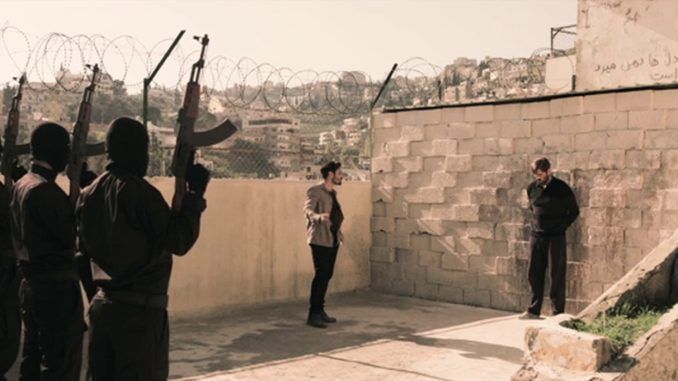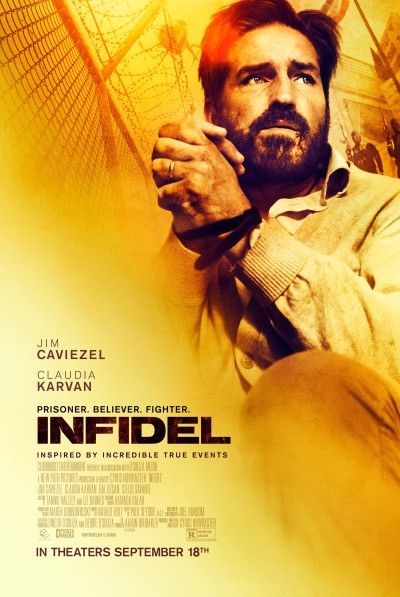
Rating: C
Dir: Cyrus Nowrasteh
Star: Jim Caviezel, Claudia Karvan, Hal Ozsan, Stelio Savante
Almost as soon as I saw the premise here, I knew this was one which was likely to trigger severely Letterboxd reviewers. It did not disappoint, the film being slammed for all variety of reasons, mostly for being shallow right-wing Christian propaganda. Looking at the kind of films beloved on the platform, I guess that makes it the wrong sort of propaganda. Personally, as someone who is of no particular religious beliefs, I didn’t find it one thing or another. It had some interesting aspects – not least it apparently fitting into the “Caviezel gets persecuted for his faith Cinematic Universe” – but didn’t especially engage my attention, with humdrum action and plotting that seemed artificial in the main.
It begins on a jail rooftop in Teheran, where Doug Rawlins (Caviezel) is about to be executed as an American spy (top). His actual crime? Being a high-profile writer who was too aggressively Christian on an Egyptian TV broadcast. This got him the attention of Hezbollah, who abduct him and spirit Doug off through Lebanon to Iran, in the care of British zealot Ramzi (Ozsan). The captive’s wife, Liz (Karvan), is a State Department official, and the couple’s recent involvement with a Muslim family also factors into the decision to try Doug for espionage. Liz goes to Iran to try and negotiate his release; when that fails, she gets an offer for more direct action to rescue her husband from the death penalty.
 I think the characters, and their relationships, are likely the film’s strongest suit. For example, Doug is strongly Christian, while Liz is not. It may seem an odd marriage on that basis, but as I can attest, opposing views are not necessarily an issue, even on contentious topics. They make for a believable couple, and their scenes together work as a result. The same goes for Ramzi, who could easily have been depicted as a cartoonish villain: it’s not the case, with some time devoted to filling in his background, and explaining how he became a holy warrior. That said, his cheerful and enthusiastic description of applying electricity to the testicles of his captives, feels like it might have strayed in from Four Lions.
I think the characters, and their relationships, are likely the film’s strongest suit. For example, Doug is strongly Christian, while Liz is not. It may seem an odd marriage on that basis, but as I can attest, opposing views are not necessarily an issue, even on contentious topics. They make for a believable couple, and their scenes together work as a result. The same goes for Ramzi, who could easily have been depicted as a cartoonish villain: it’s not the case, with some time devoted to filling in his background, and explaining how he became a holy warrior. That said, his cheerful and enthusiastic description of applying electricity to the testicles of his captives, feels like it might have strayed in from Four Lions.
On the other hand, the story-line doesn’t particularly engage, beginning with the question of why anyone would bother going to all the trouble of kidnapping a part-time blogger, and spiriting him across the Middle East. Even back when there were high-profile kidnappings (especially in the Lebanon), there was plausible deniability maintained by the state actors involved. I also have to question security protocols at Iranian prisons: the film basically waves the “Mossad!” card at them, literally, to get out of jail free. Did appreciate the lack of development for Liz: I was waiting for her to have a “road to Damascus” moment of conversion, and am glad it never happened. The problem is, nobody else seems changed either, and for what I suspect was intended to be an inspiring story, I felt barely moved.
